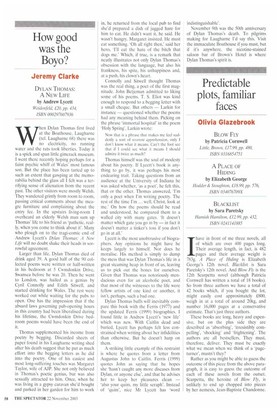How good was the Boyo?
Jeremy Clarke
DYLAN THOMAS: A NEW LIFE by Andrew Lycett Weidenfeld, £20, pp. 434, ISBN 000297607936 When Dylan Thomas first lived at the Boathouse, Laugharne (tel. Laugharne 68) there was no electricity, no running water and the rats took liberties. Today it is a spick and span little gimcrack museum. I went there recently hoping perhaps for a faint psychic whiff of Wales' most famous son. But the place has been tarted up to such an extent that gawping at the memorabilia behind the glass all I felt was a terrifying sense of alienation from the recent past. The other visitors were mostly Welsh. They wandered grimly from room to room, passing critical comments about the meagre furniture and complaining about the entry fee. In the upstairs living-room I overheard an elderly Welsh man sum up Thomas' life to his friend as 'pathetic, really, when you come to think about it'. Many who plough on to the tragi-comic end of Andrew Lycett's Dylan Thomas: A New Life will no doubt shake their heads in sorrowful agreement.
Larger than life, Dylan Thomas died of drink aged 39. A good half of the 90 collected poems were written or half-written in his bedroom at 5 Cwmdonkin Drive, Swansea before he was 20. Then he went to London, was hailed as a genius by Cyril Connolly and Edith Sitwell, and started drinking for Wales. The rest were worked out while waiting for the pubs to open. One has the impression that if the absurd laws governing pub-opening hours in this country had been liberalised during his lifetime, the Cwmdonkin Drive bedroom poems would have been the end of it.
Thomas supplemented his income from poetry by begging. Discarded sheets of paper found in his Laugharne writing shed after his death suggest that he put as much effort into the begging letters as he did into the poetry. One of his easiest and most long-suffering touches was Margaret Taylor, wife of AJP. She not only believed in Thomas's poetic genius, but was also sexually attracted to him. Once, when he was living in a gypsy caravan she'd bought and parked in her garden for him to work in, he returned from the local pub to find she'd prepared a dish of jugged hare for him to eat. He didn't want it, he said. He wasn't hungry. Margaret insisted. He must eat something. 'Oh all right then,' said her hero, 'I'll eat the hare of the bitch that dogs me.' Which, if true, is a remark that neatly illustrates not only Dylan Thomas's obsession with the language, but also his frankness, his spite, his unhappiness and, at a push, his clown's heart. Connolly and Sitwell thought Thomas was the real thing, a poet of the first magnitude. John Betjeman admitted to liking some of his poems. T. S. Eliot was kind enough to respond to a begging letter with a small cheque. But others — Larkin for instance — questioned whether the poems had any meaning behind them. Picking on the phrase 'immortal hospital' in the poem 'Holy Spring', Larkin wrote:
Now that is a phrase that makes me feel suddenly a sort of reverent apprehension, only I don't know what it means. Can't the fool see that if I could see what it means I should admire it twice as much?
Thomas himself was the soul of modesty about his poetry. If Lycett's book is anything to go by, it was perhaps his most endearing trait. Taking questions from an audience at the University of Indiana he was asked whether, 'as a poet', he felt this, that or the other. Thomas answered, 'I'm only a poet when I'm writing poetry. The rest of the time I'm ... well, Christ, look at me.' On how the poems should be read and understood, he compared them to a walled city with many gates. 'It doesn't matter which gate you go in by — in fact it doesn't matter a tinker's toss if you don't go in at all.' Lycett is the most unobtrusive of biographers. Any opinions he might have he keeps largely to himself. Nor does he moralise. His method is simply to dump the mess that was Dylan Thomas's life in a great steaming heap in front of us, leaving us to pick out the bones for ourselves. Given that Thomas was notoriously mendacious even for an alcoholic poet, and that most of the witnesses to the life were fellow artists of one kind or another, it isn't, perhaps, such a bad one. Dylan Thomas buffs will inevitably compare this book with the Ferris (1977) and the updated Ferris (1999) biographies_ I found little in Andrew Lycett's 'new life' which was new. With Caitlin dead and buried, Lycett has perhaps felt less constrained when writing about her infidelities than otherwise. But he doesn't harp on them.
A striking little example of this restraint is where he quotes from a letter from Augustus John to Caitlin. Ferris (1999) quotes John as saying that he hopes she 'hasn't caught any more diseases from Dylan, or anyone else', and that he advises her to keep her pleasures clean — 'also your quim, my little seraph'. Instead of `quim', nice Mr Lycett has 'word indistinguishable'. November 9th was the 50th anniversary of Dylan Thomas's death. To pilgrims making for Laugharne I'd say this. Visit the immaculate Boathouse if you must, but if it's anywhere, the nicotine-stained saloon bar of Brown's Hotel is where Dylan Thomas's spirit is.


























































































 Previous page
Previous page